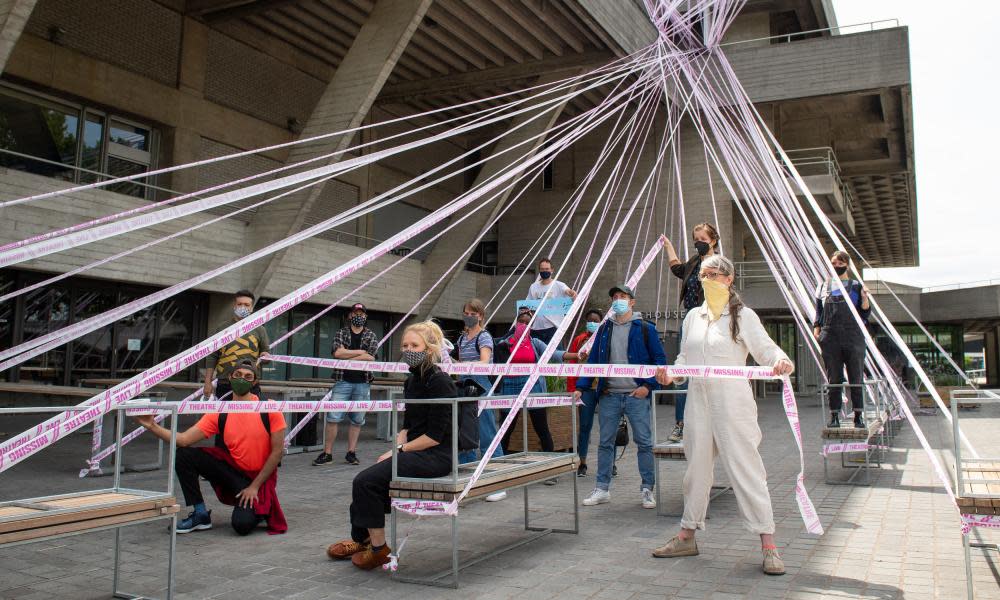I'm one of the freelancers who makes British theatre happen. Who will secure our future?

Much to the surprise of many in theatre, the government recently announced a generous arts “bailout” package of £1.57bn. But the government still risks finishing the job that coronavirus started – providing nothing more to the theatre industry than dust sheets and packing crates. Whether the money will help save the theatre industry all depends on how it is spent.
Depending on your outlook, for years arts funding has been either unevenly distributed, a total waste of money, horribly confusing or disastrously below what is required. Theatres subsidised by the Arts Council (as opposed to commercial or independent theatres) are vital places: they use much of their subsidy to keep ticket prices affordable and to produce exciting new work, including plays such as War Horse, that would otherwise be too risky. In order to satisfy Art Council conditions for their funding, which stipulate that certain roles are created in an organisation, many subsidised theatres also employ large numbers of administrative staff.
In my experience, one upshot of this growing cohort of administrators has been an emerging friction between institutions and artists. I’ve been a theatre director for 30 years, and have had the privilege of working at most of this country’s top subsidised institutions, including the National Theatre, the RSC and the Welsh National Opera. For all of that time, I’ve been aware of an uncomfortable anomaly in the difference between the way that freelance artists and full-time administrators are treated and remunerated, particularly in the larger organisations.
Like many of my colleagues, I’ve complained loudly for years that the people who create the work are the worst paid and most overlooked. “This place is basically a catering company that puts on plays,” I recently heard an actor say about one of this country’s most august theatrical institutions. “The people on the fourth floor think their lives would be much easier if the company didn’t actually have to put on any plays,” one of my director colleagues recently told me. And while it’s true that subsidised theatres spend a portion of their budget on freelancers, creatives are immediately unemployed the day after a show closes, while the admin staff turn up for another week’s work, with all the perks of holiday, sick pay, maternity leave and workplace pensions that full-time employment affords.
The coronavirus pandemic has thrown a spanner in into the works of this already imperfect system. Permanent staff were furloughed at the beginning of the lockdown, but freelancers went home, where they commenced a tortuous cycle of daytime anxiety and sleepless nights. Some were able to apply for small grants to keep the wolf from the door for a few weeks, but many of the classically trained actors and highly skilled creatives I spoke to for this piece are now delivering pizzas or making curtains, while others are eking out the hours while waiting for universal credit. Many of them have had to move out of their (rented) homes to return to live with their parents in different cities.
Now, as we watch other people start to regain a semblance of normality, we are horribly aware that theatres won’t be opening any time soon. The lights in British theatres are off, the auditoriums silent and the doors closed. We are a school with no pupils. A restaurant with no diners. A football stadium with no games being played. The conditions required to rehearse a play and present it to the public probably mean that we won’t be able to function normally again until a coronavirus vaccine becomes available. And when will that be?
Since the bailout was announced, I haven’t spoken to a single person who knows how the money will be distributed. Without intervention from the secretary of state for Digital, Culture, Media and Sport, the bailout money will in all likelihood go to the Arts Council, which will then distribute it to the institutions it has been funding for years, which will in turn probably spend it on retaining as many of their full-time (non-creative) employees as possible. But these are people who are already safe – they have received 80% of their salary for the past few months, and their skills are transferable should theatres never reopen. In the same way that hospitals are empty wards without frontline staff, institutions can’t be rescued without freelance creatives.
If the bailout money is spent only on sustaining infrastructure and institutions, a deeply flawed status quo will be temporarily propped up. What’s needed is bold new thinking to ensure a substantial proportion of this funding can find its way to artists and freelancers. Institutions could create employment schemes aimed at retaining freelancers, or commission plays that could be performed either online or in accordance with social distance guidelines. Theatres in receipt of the government’s bailout scheme could commit to protecting as much freelance talent as possible. The secretary of state could demand that a percentage of the bailout be spent on employing freelancers, consulting with artistic directors to ensure the money is spent on retaining the talent that the sector relies upon.
If the bailout money can find its way to the hands of freelance artists who have been creating the work that theatres have been putting on for decades, art will happen – and theatre might be saved. If we get this wrong, we risk losing a generation of emerging talent and seeing the demise of careers that have been built over decades. The safety nets for creatives are non-existent. Freelancers are in freefall.
• Fiona Laird is a theatre director, writer, composer and founder of the National Youth Arts Trust


